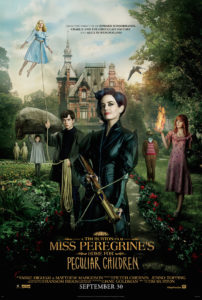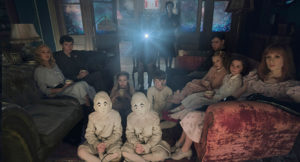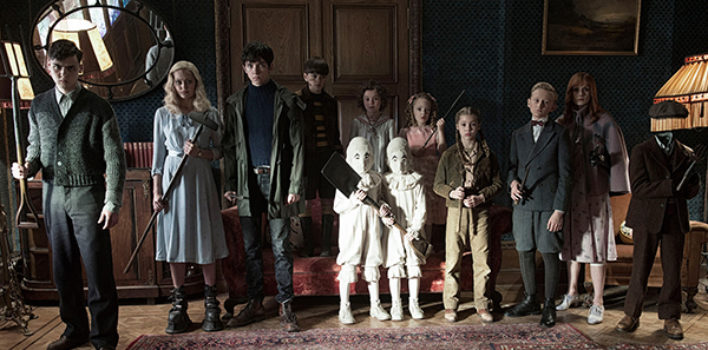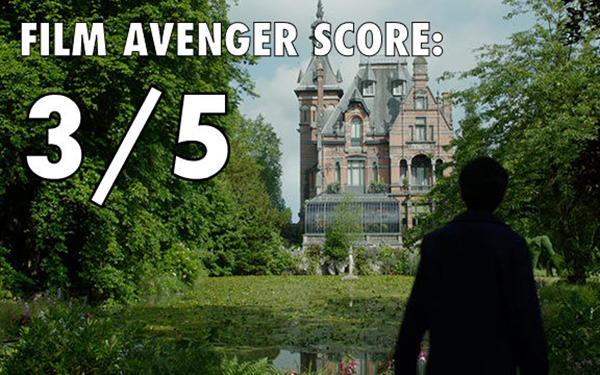Review| ‘Miss Peregrine’s Home for Peculiar Children’ is What You’d Expect From Tim Burton
 I’ve been a fan of Tim Burton’s work for many years, and have seen virtually all of Burton’s films. Several of his films are on my Top 100 list. I’ve stuck with Burton through his ups (Ed Wood, Edward Scissorhands) and downs (Planet of the Apes), especially of late. He can still be good, but he can also end up being a caricature of himself.
I’ve been a fan of Tim Burton’s work for many years, and have seen virtually all of Burton’s films. Several of his films are on my Top 100 list. I’ve stuck with Burton through his ups (Ed Wood, Edward Scissorhands) and downs (Planet of the Apes), especially of late. He can still be good, but he can also end up being a caricature of himself.
Miss Peregrine’s Home for Peculiar Children is a boilerplate Tim Burton film, which is not necessarily bad. For those that enjoy Burton’s work, it is Burton comfort food – all the things one can expect from his bag of tricks. Not groundbreaking, but still entertaining and visually arresting. However, Miss Peregrine also suffers from the malady that infects many of Burton’s films: a undercooked plot with an intriguing premise, which is eventually shoved aside for the sake of the visuals.
While I was watching this movie, a very intriguing thought struck me about not just this movie, but a pattern in many movies today that points to a desire to be unique and different.
SPOILER ALERT!
Stuff I Liked
The films of Tim Burton have always been feasts for the eyes. His training as an artist and animator gives him a sensibility for amazing visuals, and Miss Peregrine is no different. The production design is mesmerizing. Everything has a fantasy-like touch to it, despite taking place in a real time and space.
The costuming is also wonderfully realized. Like good costumes should, they reflect the personalities of the characters so much that the audience can instantly pick out what kind of persons the characters are. The colors pop and compliment the scenery so well.
Eva Green really shines in the titular role. She’s almost like Mary Poppins – seemingly perfect and all-knowing with a hint of magical quality. I’ve always thought that Green’s range as an actress was a bit limited (like Will Smith, she seems to play the same character in every film). But Burton and screenwriter Jane Goldman use Green’s limitation as a strength, masking her vindictive persona with a layer of nicety.
The real scene-stealer of this film, however, is Samuel L. Jackson as the villainous Mr. Barron. Jackson makes a great bad guy, and one can tell he’s having a great time making the movie. His lines and delivery are a great balance of comedic timing and sinister intent. I would even like the guy, if he wasn’t a creepy, demon-like creature that eats the eyeballs of children. Here’s a great clip of Jackson’s performance.
Stuff I Didn’t Like
While beautiful and unique visuals are indeed a hallmark of Tim Burton’s films, another not-so-good element in a significant portion of them is a lack of emphasis on story.
The relationship between Jake (Asa Butterfield) and his father (Chris O’Dowd) is completely dropped by the end of the film in order to expedite the plot. Burton spent a great deal of time in the first half of the film building us this relationship, and having no payoff was frustrating. Tim Burton has always had an intriguing throughput in his films about the relationship between fathers and sons (with Big Fish being the greatest example), so there was a wasted opportunity for resolution. The relationship between the father and grandfather (Terence Stamp) could have been lovely as well.
My good friend and Reel World Theology creator Mikey Fissel has a great phrase he uses on the RWT podcast (which you should definitely check out) to describe a massive plot hole: the “come on” moment. That part in the film where one looks at the screen in disbelief and either inwardly or outwardly shouts “Come on!”
Miss Peregrine has a big “come on” moment. Emma Bloom, the peculiar child that can control air played by Ella Purnell, is able to blow out the water in a room on a sunken ship – and have it be airtight. This just elicited an eye roll from me and I went with it. What made me utter “come on” was when Emma and the rest of the children used their collective peculiarities to not only raise the sunken ship, but keep in afloat, stoke the boilers to power the vessel, and steer it!
Despite being a fantasy, Miss Peregrine’s Home for Peculiar Children does take place in the real world. I could suspend my disbelief when it came to the children and their various gifts (some of which seemed to conveniently aid the story when the time came). But thinking that these kids could get a 30-year-old rusting shipwreck to surface and function was absurd on every level.
Stuff to Ponder
 While I was watching this movie, a thought continually entered my mind. Not about this movie exactly, but about the larger culture.
While I was watching this movie, a thought continually entered my mind. Not about this movie exactly, but about the larger culture.
I’ve noticed in the last few years that there have been more and more films made where the central plot centers around being different, or in the case of this film, “peculiar.” It seems that people identify with characters that are not “normal” – as if there is some desire on the part of individuals to want to be different or special. Movies like the X-Men films and even the Harry Potter series reflect a cultural desire to be different and belong to a world beyond the sight of “normal” human beings. We don’t want to be muggles; we want to be wizards.
Our culture is bombarded by humanistic thought, saying that all we are are just evolved primates and that there is nothing beyond what we see with out own eyes. However, the success of these “hidden world” stories indicate an interest on the part of the culture for what could be beyond.
“If we find ourselves with a desire that nothing in this world can satisfy, the most probable explanation is that we were made for another world.” -C.S. Lewis
I think this appetite for other worlds and a desire to be special is a collective cry from worldly-minded people for something beyond themselves. We seem to instinctively know that there is more to this world, but we don’t want to admit it because of what it would mean to our lives – exposing us for what we really are, which is sinful beings in need to redemption.
“For You created my inmost being; You knit me together in my mother’s womb. I praise You because I am fearfully and wonderfully made…Your eyes saw my unformed body; all the days ordained for me were written in Your book before one of them came to be. How precious to me are your thoughts, God!” -Psalm 139:13-17
We want to be special, and we are to the One who created us. Every life is special – not in terms of abilities or powers; that is a worldly way of looking at what makes us special. God made you and loves you more than anyone has ever loved you. You were put on this earth for a reason, and it is to love God and love others.
So What I’m Trying to Say is
Miss Peregrine’s Home for Peculiar Children is not the X-Men rip-off I thought it was going to be. It’s a beautiful film that has Tim Burton’s signature quirky sensibility. Not groundbreaking, but just the thing Burton fans expect from him.
This film and others like it point to a much broader desire on behalf of the culture – a desire to be different, or “peculiar.” I believe this comes from a hope that there is more to this world than what we can see. The truth is that we are special, but not in the way we think. It’s a much better way – a way that leads to our Creator and His love for us.








